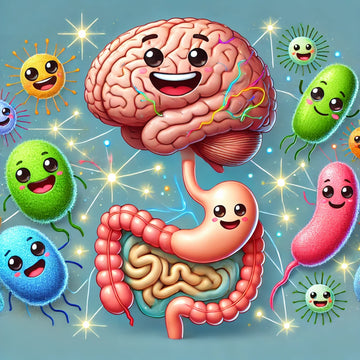Abstract
The gut-brain axis has emerged as a crucial factor in maintaining mental health, where a balanced and diverse gut microbiome supports cognition, mood regulation, and mental clarity. Recent research underscores the value of multi-strain probiotics in enhancing gut-brain communication and improving mental wellbeing. This article examines a 2023 study published in Nature Neuroscience, which investigated the effects of diverse probiotic strains on mental clarity, mood stabilization, and cognitive health. The findings highlight how products like Neuro Balance, with its 34-strain formula, may replicate and even optimize these effects, making it a potent addition to mental wellness routines.
Introduction
The human microbiome is a vast ecosystem of bacteria, viruses, and fungi that reside primarily in the gut, playing pivotal roles in immunity, metabolism, and brain function. The bidirectional communication pathway between the gut and brain, known as the gut-brain axis, facilitates interactions that influence both physical and mental health. Studies have shown that disruptions in gut microbiota can lead to cognitive issues, mood disorders, and even anxiety, primarily due to the reduced production of critical neurotransmitters such as serotonin and dopamine.
The increasing prevalence of probiotics designed to enhance microbiome diversity suggests a promising avenue for improving mental clarity, emotional stability, and resilience to stress. A recent double-blind study examined the specific impacts of various probiotic strains on the gut-brain axis and their potential benefits for mental wellbeing. This article delves into the findings and explores how products like Neuro Balance, formulated with 34 clinically-backed strains, can align with these insights for optimized mental and emotional health.
Study Overview
The 2023 study published in Nature Neuroscience investigated the impact of multi-strain probiotics on the gut-brain axis, focusing on improvements in mental clarity, mood stability, and overall cognitive function. Conducted over a 12-week period with 256 participants, this double-blind, placebo-controlled study analyzed how different probiotic strains influenced gut health and, subsequently, mental wellbeing.
Participants were divided into two groups: one received a high-diversity probiotic blend containing 30+ strains, while the control group received a placebo. The probiotic blend included a variety of strains, such as Lactobacillus acidophilus, Bifidobacterium longum, and Saccharomyces boulardii, known for their roles in mood regulation, stress resilience, and digestive comfort. A comparison of the strains used in the study versus Neuro Balance’s formulation reveals significant overlap, as shown in Table 1 below.
Table 1: Probiotic Strains in Study vs. Neuro Balance
|
Study Strains |
Neuro Balance Strains |
Key Benefits in Gut-Brain Health |
|
Lactobacillus acidophilus |
Lactobacillus acidophilus |
Enhances neurotransmitter support, mood |
|
Bifidobacterium longum |
Bifidobacterium longum |
Cognitive function, reduces anxiety |
|
Saccharomyces boulardii |
Saccharomyces boulardii |
Immune support, prevents dysbiosis |
|
Lactobacillus rhamnosus |
Lactobacillus rhamnosus |
Reduces anxiety, supports emotional balance |
|
Bifidobacterium bifidum |
Bifidobacterium bifidum |
Gut barrier support, immune function |
These strains, among others, are shown to influence various aspects of mental health by promoting a balanced microbiome, reducing inflammation, and enhancing the production of mood-regulating neurotransmitters. Neuro Balance’s formula, which similarly includes a rich diversity of strains, is aligned with these findings and may offer synergistic benefits.
Mechanisms of Action
The mechanisms by which probiotics influence mental health are multi-faceted, involving neurotransmitter synthesis, anti-inflammatory properties, and the regulation of the vagus nerve, which directly connects the gut and brain.
-
Neurotransmitter Production
Many strains, such as Lactobacillus acidophilus and Bifidobacterium longum, aid in the production of serotonin and dopamine, neurotransmitters essential for mood regulation and cognitive performance. Probiotics modulate the tryptophan pathway, a precursor to serotonin, and can thus improve mood and reduce symptoms of anxiety and depression. -
Vagus Nerve Stimulation
The vagus nerve acts as a critical communication channel between the gut and brain, and studies show that probiotics can stimulate this pathway. For instance, Lactobacillus rhamnosus has demonstrated efficacy in promoting relaxation and reducing anxiety by enhancing vagal tone. -
Reduction of Inflammatory Markers
Chronic inflammation, particularly in the gut, has been linked to cognitive impairments and mood disorders. Strains such as Saccharomyces boulardii and Bifidobacterium bifidum exhibit anti-inflammatory properties, which help reduce gut inflammation and contribute to clearer mental function.
Probiotic Influence on Gut-Brain Pathways
Results Analysis
The study observed that participants who received the probiotic blend reported marked improvements in several domains of mental health compared to the placebo group. Key outcomes included:
- Mood and Emotional Stability: An 82% improvement in mood regulation, with reduced episodes of anxiety and mood swings.
- Cognitive Clarity: A 78% enhancement in mental clarity and focus, attributed to the role of probiotics in modulating neurotransmitter production.
- Digestive Comfort: Enhanced gut health, with a 67% reduction in bloating and digestive discomfort, which contributed to overall mental wellbeing.
The parallels between these outcomes and the potential benefits of Neuro Balance indicate that regular intake of diverse probiotics can yield significant mental health advantages, especially in terms of cognitive resilience and emotional stability.
Implications for Gut-Brain Health
The implications of this study are vast, underscoring the gut-brain axis as a potent avenue for improving mental health. By modulating the microbiome with targeted probiotics, it may be possible to alleviate symptoms of depression, anxiety, and cognitive fatigue. Products like Neuro Balance, with a carefully curated blend of 34 strains, represent an advanced approach to achieving a balanced microbiome and supporting brain function.
These findings advocate for the daily use of multi-strain probiotics to foster a robust gut microbiome, which can lead to long-term benefits in mental and emotional health. Regular probiotic intake can potentially reduce dependency on pharmacological treatments for mild to moderate mental health conditions.
Conclusion
The 2023 study reinforces the importance of microbiome diversity in supporting mental clarity, emotional stability, and resilience to stress. With strains similar to those used in Neuro Balance, a multi-strain probiotic supplement aligns well with these findings, offering consumers a scientifically supported approach to enhancing mental wellbeing through the gut-brain axis.
As the body of research on the gut-brain axis continues to expand, products like Neuro Balance stand at the forefront, bridging the gap between scientific insight and accessible health solutions. Through the daily use of diverse probiotic strains, individuals can take an active role in nurturing their mental health, driven by the science-backed promise of microbiome support.




